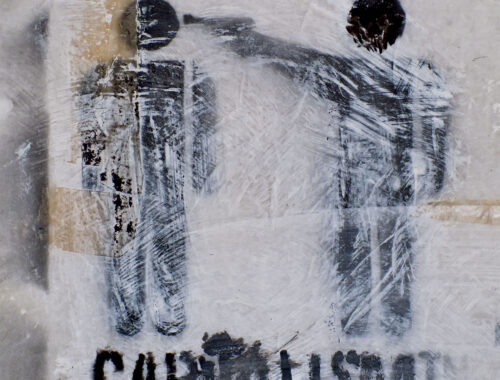9 Historier ved Vintersolhverv og Juletid

9 historier, der på forskellig vis, bryder det samme lys, ved vintersolhverv og (h)jul. 9 historier der gennem illusion forsøger at gengive virkelighed. 9 historier som ikke er mere illusion end så meget andet. Det er modtagelsen perceptionen, de stemninger følelser og tanker som de fremkalder, samt de associationer der forbinder dem indbyrdes, der er afgørende. Troen formår hvad forstanden ikke forstår. Troen er ikke noget bestemt – det kan være en barnetro, ” i god tro ” – eller ” i ond mening ” – uanset udfaldet hinsides godt og ondt. Det kan være sund tvivl blandt “vantro”, eller “rettroende” på afveje, i blind tro og loyalitet, i bedste mening.

9 udkrystallisationer af det samme stof
.
.
Indhold :
.
.
1)
Lysningen – af Omar Ingerslev
( Folkets historie – fra landsbyfællesskaber til isolation i byer, med afsæt i “Grantræet” og “Pigen med Svovlstikkerne af H. C. Andersen )
.
2)
The Orphan – by Dostojevski
( “samme” historie som “pigen med svovlstikkerne”, tilføjet flere ekstra dimensioner )
.
3)
The legend of the Christmas Rose – by Selma Lagerlöf
( åndsbeslægtet med de 2 første historier )
.
4)
Mand Forbi – historien om en hjemløs, fortalt af Benny M.Jørgen, nedskrevet af O.I.
( en moderne version af de 3 forrige historier )
.
5)
Gerth og gæssene … and guess who – af Omar Ingerslev
( en rig mand uden penge, en moderne version af de 4 forrige historier, variant over historie 4) )
.
6)
Øjemennesket Kirsten Rose – liv kunst og roser gror på møddinger – af Omar Ingerslev
( et rigt menneske, både materielt og åndeligt, som ikke ligger under for det, men føler sig rig – og tilmed finder rigdom i det kasserede )
.
7)
Bethlehem in Darkness – by Steven Sahiounie, December 16, 2023
( … for 2000 år siden var herbergerne i Bethlehem alle optagede – idag står de tomme … for 2000 år siden lyste en stjerne – idag har mørket sænket sig … ) ~ ” Thus spoke the Profit ”
*
Pastor Munther Issac at the Evangelical Lutheran Church in Bethlehem, delivered a powerful Christmas sermon on the war in Gaza and why the world must stand with Palestinians. ” The hypocrisy and racism of the Western world is transparent and appalling ” :
https:/∆/video.twimg.com/amplify_video/1739637697306587136/vid/avc1/640×360/jgu8SBTuTTPYU86f.mp4
( remove ∆ and you have the full link )
.
8)
The death of Israel – by Chris Hedges, december 2023
( … en realistisk fremskrivning af udviklingen i Israel … Chris Hedges har fået medhold i de fleste analyser og beskrivelser gennem årene ) ~ ” Thus spoke the Profet ”
.
9)
” Thus spoke Zarathustra “ – by F. Nietzsche
.
.
( 1 )
Folkets historie – fra landsbyfællesskaber til isolation i byer – gennem lidelser og forvandling
– med afsæt i H. C. Andersen ´ s ” Grantræet ” og ” Pigen med Svovlstikkerne “
I Norden bruges endnu det gamle ord (H)jul om vintersolhverv.
Siden kom kristendommen og historien om Jesus og stjal “hjulet”,
men det er en anden historie.
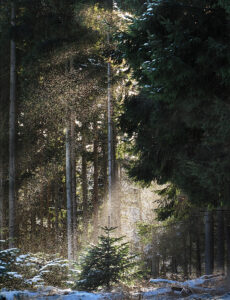
Stormen havde nedlagt flere af de største træer i skoven. Der var opstået en lysning, hvor kæmperne havde mistet fodfæstet. Her forberedte hemmelige væsner i undergrunden sig på ny. Regnen gennemvædede lysningen, solen gav varme, jorden var næringsrig, kogler fra de faldne træer havde fået fodfæste og begyndte snart at spire. De første spinkle grene strakte sig usikkert og skrøbeligt op mod himlen. Vinden styrkede dem. En let parfumeret duft af nye skud fyldte om foråret luften. Skovens dyr spiste af de friske skud, da de endnu ikke var hærdede. En enkelt overlevede, et lille grantræ, som heller ikke haren ænsede når den hoppede rundt i skovbunden for at lede efter nødder og bær. Det tredie år måtte haren vige, da det lille træ tog til i vækst, og beslutsomt indtog sin plads. Børnene var på tur i skoven med deres familier. De havde også opdaget det lille grantræ, var begyndt at holde af det, og inddrog det i deres leg.
Det blev vinter. Sneen udsmykkede skoven. Alt blev smukkere og endnu mere stille. Iskrystaller glimtede som diamanter, sne dannede rene hvide flader, og dyrespor lignede digte på et ukendt sprog, nedskrevet af en mester i kalligrafi. Skoven og dens gæster holdt åndedrættet tilbage, i andægtighed over den insisterende og påtrængende skønhed. Frostsneens knagen under fodtrinene lød som sammenknuget vat eller gnavent og surt fodtøj. Da en familie passerede lysningen, skreg børnene spontant af begejstring over synet. For øjnene af dem blev det lille grantræ af sneen pyntet mere op end noget træ de havde set juleaften. Børnene trak i forældrene, og tryglede om at få det med hjem. Faderen tog til genmæle : ” vil I ødelægge så fin og sart en skønhed, som kun kan eksistere her ude i kulden, som ikke kan ejes og hjemføres til opvarmede stuer ? “. Børnene blev stille og vidste ikke hvad de skulle svare. Hele familien stod tryllebundet og så på det lille mirakel. De turde ikke foretage sig noget, i en blanding af usikkerhed og respekt for noget som de ikke helt vidste hvad var. Faderens ord brændte længe i dem. Efter en lang pause fortsatte han : ” Lad det nu stå, så andre også kan opleve det. Så kan vi tænke over det – og tage herud igen, hvis der stadig er stemning for at tage det med hjem til jul “
*
I et gammelt stråtækt hus i skoven boede en pige med sine gamle forældre. Om sommeren samlede de honning, bivoks og brænde, om vinteren støbte de lys. Året igennem samlede pigen grene og kviste i lysningen efter de faldne træer. Hun havde fulgt de nye skud efter stormen, og kendte dem hver især, og anså dem for at være sine gode naboer og venner.
Denne vinter var særlig hård, og skønheden så meget desto mere overvældende. Da solen brød igennem, landede dens stråler på det lille grantræ i lysningen. En vind rejste sig og rystede sneen af de store træer. Iskrystaller glimtede i solstrålen og dalede langsomt ned mod det lille grantræ. Ingen kunne ryste synet af sig. Pigen fyldtes af en knugende uro og ængstelse. Hun vidste hvad der kunne ske, når sneen faldt og gjorde dem mere synlige for nysgerrige øjne.
Selvom hun var forberedt, overvældede sorgen hende, da hun en morgen kom til ud til lysningen og så, at det lille grantræ var afsavet ved rode og fjernet fra stedet. Men det ramte endnu dybere, for hendes gamle forældre skræntede i den hårde vinter. Af desperation og fortvivlelse udtænkte hun en redningsplan. Det var tydeligt at deres chancer for at komme igennem vinteren svandt hurtigere end hun allerede frygtede.
Pigen satte tempoet op og indsamlede flere grene end hun plejede. Hun løb hjem, og samlede i al hast så mange lys hun kunne bære. Derpå begav hun sig alene på den besværlige rejse mod byen. I sin iver og travlhed kunne hun ikke mærke sulten. Når hun blev tørstig greb hun blot sneen med de frosne hænder og smeltede den i munden. Skønheden betød mere for hende end kulden.
*
I byen havde folk travlt. Hun solgte godt af lysene. Hendes bekymring for de gamle forældre drev hende til at blive ved. Hun vidste ikke hvor meget hun skulle sælge, eller hvor langt hun skulle gå. Derfor fortsatte hun længere end klogt var; selvom hendes ansvarsfølelse var stor, var hun stadig et barn. Dagen gik på hæld, mørket og kulden kom umærkeligt og uafviseligt snigende. Nu tændtes byens lys, i gader og de mange huse. Vinduerne ud mod gaden lystes op. Det var trylleri – en anden og uimodståelig skønhed end den hun kendte fra skoven. Kontrasten mellem opvarmede stuer badet i gyldent lys, og gadernes kolde blå skygger, var en fryd for øjet. Af begejstring og opslukthed glemte hun helt at sælge lysene, og gik tryllebundet fra vindue til vindue for at kigge ind i hver eneste stue – som et barn der utålmodigt længes efter at lukke alle lågerne op i en julekalender, for at se hvad der gemmer sig bag.
Da hun kom forbi endnu et vindue, gav det et gisp i hende. Inde i stuen genkendte hun det lille grantræ fra lysningen i skoven. En indigneret harme fik kortvarigt blodet til at brænde i kinderne, indtil hun opdagede hvordan træet var ved at blive pyntet op til jul. Pigen bøjede sig endnu en gang for en ny og ukendt skønhed, og glemte al nag. Hun så gennem vinduet hvordan de pyntede træet med farvestrålende glaskugler, kurve, dyr og fugle. Der kom frugt og søde sager i de små kurve. Der blev sat levende lys på, magen til dem hun selv havde støbt. Træet fra lysningen lyste nu selv. Gaverne bugnede under de laveste grene. Pigens hjerte brændte. Hun gav sig hen til børnenes glæde over det lille grantræ. Hun mærkede en varmt strømmende lyst efter at tilslutte sig selskabet, og fortælle dem om grantræets opvækst, så de kunne være sammen i fælles glæde og forundring over det – men kølnedes hurtigt, da det gik op for hende, at det kunne føre til pinlige optrin, hvis hun røbede sammenhængen.
Pigens begejstring over alle de mange indtryk fra byen samledes i en mæthedsfølelse, som siden blev til træthed. Hun følte sig gradvist mere draget mod snedriverne, som mindede om en seng med fyldige bløde dyner. Hun gav efter og lagde sig i snedriverne, og blundede. Halvt vågen halvt drømmende var hun både ude i gadens kulde og mørke, og inde i de oplyste og varme stuer. Med en følelse af lettelse bemærkede hun at kulden ikke længere gjorde ondt, og gav efter for trætheden og søvnen. Drømmene om at være inde fortrængte følelsen af at være ude. Hun fyldtes af en lykkefølelse, mens hun stille gled over i søvnen.
*
En gruppe store knægte, som havde været ude og feste, var de første der fandt den livløse pige. Snarrådigt dækkede de andre, mens den ene undersøgte pigen. Han fandt nogle småmønter, og udbrød spontant i et overbærende tonefald : ” (suk) … hvem kan leve af DET ? … måske var det bedst, at hun fik fred… “. Han slog armene ud og rystede på hovedet. Selskabet bevægede sig atter videre under råben og sang. Mønterne blev indløst for lidt mere øl.
Huset i skoven lå indhyllet i mørke og sneens blålige skær. Vinduerne var dækket af iskrystaller, hvorigennem et svagt og nervøst blafrende lys kom indefra. Intet andet kunne man se og høre, hverken ude eller inde. I lysningen blev alt adskilt under larm og postyr, og siden i stilhed samlet.
( 2 )
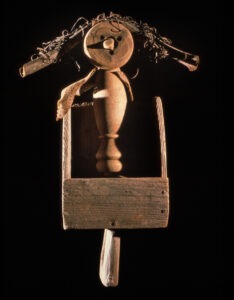
The Little Orphan – by Fjodor Dostojewski
I
In a large city, on Christmas eve in the biting cold, I see a young child, still quite young, six years old, perhaps even less; yet too young to be sent on the street begging, but assuredly destined to be sent in a year or two.
This child awakes one morning in a damp and frosty cellar. He is wrapped in a kind of squalid dressing-gown and is shivering. His breath issues from between his lips in white vapor; he is seated on a trunk; to pass the time he blows the breath from his mouth, and amuses himself in seeing it escape. But he is very hungry. Several times since morning he has drawn near the bed covered with a straw mattress as thin as gauze, where his mother lies sick, her head resting on a bundle of rags instead of a pillow.
How did she come there? She came probably from a strange city and has fallen ill. The proprietress of the miserable lodging was arrested two days ago, and carried to the police station; it is a holiday to-day, and the other tenants have gone out. However, one of them has remained in bed for the last twenty-four hours, stupid with drink, not having waited for the holiday.
From another corner issue the complaints of an old woman of eighty years, laid up with rheumatism. This old woman was formerly a children’s nurse somewhere; now she is dying all alone. She whines, moans, and growls at the little boy, who begins to be afraid to come near the corner where she lies with the death rattle in her throat. He has found something to drink in the hallway, but he has not been able to lay his hand on the smallest crust of bread, and for the tenth time he comes to wake his mother. He finishes by getting frightened in this darkness.
The evening is already late, and no one comes to kindle the fire. He finds, by feeling around, his mother’s face, and is astonished that she no longer moves and that she has become as cold as the wall.
“It is so cold!” he thinks.
He remains some time without moving, his hand resting on the shoulder of the corpse. Then he begins to blow in his fingers to warm them, and, happening to find his little cap on the bed, he looks softly for the door, and issues forth from the underground lodging.
He would have gone out sooner had he not been afraid of the big dog that barks all the day up there on the landing before their neighbor’s door.
Oh! what a city! never before had he seen anything like it. Down yonder from where he came, the nights are much darker. There is only one lamp for the whole street; little low wooden houses, closed with shutters; in the street from the time it grows dark, no one; every one shut up at home: only a crowd of dogs that howl, hundreds, thousands of dogs, that howl and bark all the night. But then, it used to be so warm there! And he got something to eat. Here, ah! how good it would be to have something to eat! What a noise here, what an uproar! What a great light, and what a crowd of people! What horses, and what carriages! And the cold, the cold! The bodies of the tired horses smoke with frost and their burning nostrils puff white clouds; their shoes ring on the pavement through the soft snow. And how every body hustles every body else! “Ah! how I would like to eat a little piece of something. That is what makes my fingers ache so.”
II
A policeman just passes by, and turns his head so as not to see the child.
“Here is another street. Oh! how wide it is! I shall be crushed to death here, I know; how they all shout, how they run, how they roll along! And the light, and the light! And that, what is that? Oh! what a big window pane! And behind the pane, a room, and in the room a tree that goes up to the ceiling; it is the Christmas tree. And what lights under the tree! Such papers of gold, and such apples! And all around dolls and little hobby-horses. There are little children well-dressed, nice, and clean; they are laughing and playing, eating and drinking things. There is a little girl going to dance with the little boy. How pretty she is! And there is music. I can hear it through the glass.”
The child looks, admires, and even laughs. He feels no longer any pain in his fingers or feet. The fingers of his hand have become all red, he cannot bend them any more, and it hurts him to move them. But all at once, he feels that his fingers ache; he begins to cry, and goes away. He perceives through another window another room, and again trees and cakes of all sorts on the table, red almonds and yellow ones. Four beautiful ladies are sitting down, and when any body comes he is given some cake: and the door opens every minute, and many gentlemen enter. The little fellow crept forward, opened the door of a sudden, and went in. Oh! what a noise was made when they saw him, what confusion! Immediately a lady arose, put a kopeck in his hand, and opened herself the street door for him. How frightened he was!
III
The kopeck has fallen from his hands, and rings on the steps of the stairs. He was not able to tighten his little fingers enough to hold the coin. The child went out running, and walked fast, fast. Where was he going? He did not know. And he runs, runs, and blows in his hands. He is troubled. He feels so lonely, so frightened! And suddenly, what is that again! A crowd of people stand there and admire.
“A window! behind the pane, three pretty dolls attired in wee red and yellow dresses, and just exactly as though they were alive! And that little old man sitting down, who seems to play the fiddle. There are two others, too, standing up, who play on tiny violins, keeping time with their heads to the music. They look at each other and their lips move. And they really speak? Only they cannot be heard through the glass.”
And the child first thinks that they are living, and when he comprehends that they are only dolls, he begins to laugh. Never had he seen such dolls before, and he didn’t know that there were any like that! He would like to cry, but those dolls are just too funny!
IV
Suddenly he feels himself seized by the coat. A big rough boy stands near him, who gives him a blow of his fist on the head, snatches his cap, and trips him up.
The child falls. At the same time there is a shout; he remains a moment paralyzed with fear. Then he springs up with a bound and runs, runs, darts under a gateway somewhere and hides himself in a court-yard behind a pile of wood. He cowers and shivers in his fright; he can hardly breathe.
And suddenly he feels quite comfortable. His little hands and feet don’t hurt any more; he is warm, warm as though near a stove, and all his body trembles.
“Ah! I am going asleep! how nice it is to have a sleep! I shall stay a little while and then I will go and see the dolls again,” thought the little fellow, and he smiled at the recollection of the dolls. “They looked just as though they were alive!”
Then he hears his mother’s song. “Mamma, I am going to sleep. Ah! how nice it is here for sleeping!”
“Come to my house, little boy, to see the Christmas tree,” said a soft voice.
He thought at first it was his mother; but no, it was not she.
Then who is calling him? He does not see. But some one stoops over him, and folds him in his arms in the darkness: and he stretches out his hand and–all at once–oh! what light! Oh! what a Christmas tree! No, it is not a Christmas tree; he has never seen the like of it!
Where is he now? All is resplendent, all is radiant, and dolls all around; but no, not dolls, little boys, little girls; only they are very bright. All of them circle round him; they fly. They hug him, they take him and carry him away, and he is flying too. And he sees his mother looking at him and laughing joyfully.
“Mamma! mamma! ah! how nice it is here!” cries her little boy to her.
And again he embraces the children, and would like very much to tell them about the dolls behind the window pane. “Who are you, little girls?” he asks, laughing and fondling them.
It is the Christmas tree at Jesus’s.
At Jesus’s, that day, there is always a Christmas tree for little children that have none themselves.
And he learned that all these little boys and girls were children like himself, who had died like him. Some had died of cold in the baskets abandoned at the doors of the public functionaries of St. Petersburg; others had died out at nurse in the foul hovels of the Tchaukhnas; others of hunger at the dry breasts of their mothers during the famine. All were here now, all little angels now, all with Jesus, and He Himself among them, spreading his hands over them, blessing them and their sinful mothers.
And the mothers of these children are there too, apart, weeping; each recognizes her son or her daughter, and the children fly towards them, embrace them, wipe away the tears with their little hands, and beg them not to weep.
And below on the earth, the concierge in the morning found the wee corpse of the child, who had taken refuge in the courtyard. Stiff and frozen behind the pile of wood it lay.
The mother was found too. She died before him; both are reunited in Heaven in the Lord’s house.
( 3 )
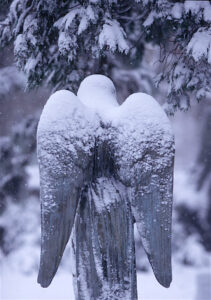
The Legend of the Christmas Rose
( Selma Lagerlöf )
Robber Mother, who lived in Robbers’ Cave in Göinge Forest, went down to the village one day on a begging tour. Robber Father, who was an outlawed man, did not dare to leave the forest, but had to content himself with lying in wait for the wayfarers who ventured within its borders. But at that time travelers were not very plentiful in Southern Skåne. If it so happened that the man had had a few weeks of ill luck with his hunt, his wife would take to the road. She took with her five youngsters, and each youngster wore a ragged leathern suit and birch-bark shoes and bore a sack on his back as long as himself. When Robber Mother stepped inside the door of a cabin, no one dared refuse to give her whatever she demanded; for she was not above coming back the following night and setting fire to the house if she had not been well received. Robber Mother and her brood were worse than a pack of wolves, and many a man felt like running a spear through them; but it was never done, because they all knew that the man stayed up in the forest, and he would have known how to wreak vengeance if anything had happened to the children or the old woman.
Now that Robber Mother went from house to house and begged, she came one day to Övid, which at that time was a cloister. She rang the bell of the cloister gate and asked for food. The watchman let down a small wicket in the gate and handed her six round bread cakes – one for herself and one for each of the five children.
While the mother was standing quietly at the gate, her youngsters were running about. And now one of them came and pulled at her skirt, as a signal that he had discovered something which she ought to come and see, and Robber Mother followed him promptly.
The entire cloister was surrounded by a high and strong wall, but the youngster had managed to find a little back gate which stood ajar. When Robber Mother got there, she pushed the gate open and walked inside without asking leave, as it was her custom to do.
Övid Cloister was managed at that time by Abbot Hans, who knew all about herbs. Just within the cloister wall he had planted a little herb garden, and it was into this that the old woman had forced her way.
At first glance Robber Mother was so astonished that she paused at the gate. It was high summertide, and Abbot Hans’s garden was so full of flowers that the eyes were fairly dazzled by the blues, reds, and yellows, as one looked into it. But presently an indulgent smile spread over her features, and she started to walk up a narrow path that lay between many flower-beds.
In the garden a lay brother walked about, pulling up weeds. It was he who had left the door in the wall open, that he might throw the weeds and tares on the rubbish heap outside.
When he saw Robber Mother coming in, with all five youngsters in tow, he ran toward her at once and ordered them away. But the beggar woman walked right on as before. She cast her eyes up and down, looking now at the stiff white lilies which spread near the ground, then on the ivy climbing high upon the cloister wall, and took no notice whatever of the lay brother.
He thought she had not understood him, and wanted to take her by the arm and turn her toward the gate. But when the robber woman saw his purpose, she gave him a look that sent him reeling backward. She had been walking with back bent under her beggar’s pack, but now she straightened herself to her full height. “I am Robber Mother from Göinge Forest; so touch me if you dare!” And it was obvious that she was as certain she would be left in peace as if she had announced that she was the Queen of Denmark.
And yet the lay brother dared to oppose her, although now, when he knew who she was, he spoke reasonably to her, “You must know, Robber Mother, that this is a monks’ cloister, and no woman in the land is allowed within these walls. If you do not go away, the monks will be angry with me because I forgot to close the gate, and perhaps they will drive me away from the cloister and the herb garden.”
But such prayers were wasted on Robber Mother. She walked straight ahead among the little flower-beds and looked at the hyssop with its magenta blossoms, and at the honeysuckles, which were full of deep orange-colored flower clusters.
Then the lay brother knew of no other remedy than to run into the cloister and call for help.
He returned with two stalwart monks, and Robber Mother saw that now it meant business! With feet firmly planted she stood in the path and began shrieking in strident tones all the awful vengeance she would wreak on the cloister if she couldn’t remain in the herb garden as long as she wished. But the monks did not see why they need fear her and thought only of driving her out. Then Robber Mother let out a perfect volley of shrieks, and, throwing herself upon the monks, clawed and bit at them; so did all the youngsters. The men soon learned that she could overpower them, and all they could do was to go back into the cloister for reinforcements.
As they ran through the passageway which led to the cloister, they met Abbot Hans, who came rushing out to learn what all this noise was about. Then they had to confess that Robber Mother from Göinge Forest had come into the cloister and that they were unable to drive her out and must call for assistance.
But Abbot Hans upbraided them for using force and forbade their calling for help. He sent both monks back to their work, and although he was an old and fragile man, he took with him only the lay brother.
When Abbot Hans came out in the garden, Robber Mother was still wandering among the flower-beds. He regarded her with astonishment. He was certain that Robber Mother had never before seen an herb garden; yet she sauntered leisurely between all the small patches, each of which had been planted with its own species of rare flower, and looked at them as if they were old acquaintances. At some she smiled, at others she shook her head.
Abbot Hans loved his herb garden as much as it was possible for him to love anything earthly and perishable. Wild and terrible as the old woman looked, he couldn’t help liking that she had fought with three monks for the privilege of viewing the garden in peace. He came up to her and asked in a mild tone if the garden pleased her.
Robber Mother turned defiantly toward Abbot Hans, for she expected only to be trapped and overpowered. But when she noticed his white hair and bent form, she answered peaceably, “First, when I saw this, I thought I had never seen a prettier garden; but now I see that it can’t be compared with one I know of.”
*
.
Abbot Hans had certainly expected a different answer. When he heard that Robber Mother had seen a garden more beautiful than his, a faint flush spread over his withered cheek. The lay brother, who was standing close by, immediately began to censure the old woman. “This is Abbot Hans,” said he, “who with much care and diligence has gathered the flowers from far and near for his herb garden. We all know that there is not a more beautiful garden to be found in all Skåne, and it is not befitting that you, who live in the wild forest all the year around, should find fault with his work.”
“I don’t wish to make myself the judge of either him or you,” said Robber Mother. “I’m only saying that if you could see the garden of which I am thinking you would uproot all the flowers planted here and cast them away like weeds.”
But the Abbot’s assistant was hardly less proud of the flowers than the Abbot himself, and after hearing her remarks he laughed derisively. “I can understand that you only talk like this to tease us. It must be a pretty garden that you have made for yourself amongst the pines in Göinge Forest! I’d be willing to wager my soul’s salvation that you have never before been within the walls of an herb garden.”
Robber Mother grew crimson with rage to think that her word was doubted, and she cried out: “It may be true that until today I had never been within the walls of an herb garden; but you monks, who are holy men, certainly must know that on every Christmas Eve the great Göinge Forest is transformed into a beautiful garden, to commemorate the hour of our Lord’s birth. We who live in the forest have seen this happen every year. And in that garden I have seen flowers so lovely that I dared not lift my hand to pluck them.”
The lay brother wanted to continue the argument, but Abbot Hans gave him a sign to be silent. For, ever since his childhood, Abbot Hans had heard it said that on every Christmas Eve the forest was dressed in holiday glory. He had often longed to see it, but he had never had the good fortune. Eagerly he begged and implored Robber Mother that he might come up to the Robbers’ Cave on Christmas Eve. If she would only send one of her children to show him the way, he could ride up there alone, and he would never betray them – on the contrary, he would reward them, in so far as it lay in his power.
Robber Mother said no at first, for she was thinking of Robber Father and of the peril which might befall him should she permit Abbot Hans to ride up to their cave. At the same time the desire to prove to the monk that the garden which she knew was more beautiful than his got the better of her, and she gave in. “But more than one follower you cannot take with you,” said she, “and you are not to waylay us or trap us, as sure as you are a holy man.”
This Abbot Hans promised, and then Robber Mother went her way. Abbot Hans commanded the lay brother not to reveal to a soul that which had been agreed upon. He feared that the monks, should they learn of his purpose, would not allow a man of his years to go up to the Robbers’ Cave.
Nor did he himself intend to reveal his project to a human being. And then it happened that Archbishop Absalon from Lund came to Övid and remained through the night. When Abbot Hans was showing him the herb garden, he got to thinking of Robber Mother’s visit, and the lay brother, who was at work in the garden, heard Abbot Hans telling the Bishop about Robber Father, who these many years had lived as an outlaw in the forest, and asking him for a letter of ransom for the man, that he might lead an honest life among respectable folk. “As things are now,” said Abbot Hans, “his children are growing up into worse malefactors than himself, and you will soon have a whole gang of robbers to deal with up there in the forest.”
But the Archbishop replied that he did not care to let the robber loose among honest folk in the villages. It would be best for all that he remain in the forest.
Then Abbot Hans grew zealous and told the Bishop all about Göinge Forest, which, every year at Yuletide, clothed itself in summer bloom around the Robbers’ Cave. “If these bandits are not so bad but that God’s glories can be made manifest to them, surely we cannot be too wicked to experience the same blessing.”
The Archbishop knew how to answer Abbot Hans. “This much I will promise you, Abbot Hans,” he said, smiling, “that any day you send me a blossom from the garden in Göinge Forest, I will give you letters of ransom for all the outlaws you may choose to plead for.”
The lay brother apprehended that Bishop Absalon believed as little in this story of Robber Mother’s as he himself; but Abbot Hans perceived nothing of the sort, but thanked Absalon for his good promise and said that he would surely send him the flower.
Abbot Hans had his way. And the following Christmas Eve he did not sit at home with his monks in Övid Cloister, but was on his way to Göinge Forest. One of Robber Mother’s wild youngsters ran ahead of him, and close behind him was the lay brother who had talked with Robber Mother in the herb garden.
Abbot Hans had been longing to make this journey, and he was very happy now that it had come to pass. But it was a different matter with the lay brother who accompanied him. Abbot Hans was very dear to him, and he would not willingly have allowed another to attend him and watch over him; but he didn’t believe that he should see any Christmas Eve garden. He thought the whole thing a snare which Robber Mother had, with great cunning, laid for Abbot Hans, that he might fall into her husband’s clutches.
While Abbot Hans was riding toward the forest, he saw that everywhere they were preparing to celebrate Christmas. In every peasant settlement fires were lighted in the bathhouse to warm it for the afternoon bathing. Great hunks of meat and bread were being carried from the larders into the cabins, and from the barns came the men with big sheaves of straw to be strewn over the floors.
As he rode by the little country churches, he observed that each parson, with his sexton, was busily engaged in decorating his church; and when he came to the road which leads to Bösjo Cloister, he observed that all the poor of the parish were coming with armfuls of bread and long candles, which they had received at the cloister gate.
When Abbot Hans saw all these Christmas preparations, his haste increased. He was thinking of the festivities that awaited him, which were greater than any the others would be privileged to enjoy.
But the lay brother whined and fretted when he saw how they were preparing to celebrate Christmas in every humble cottage. He grew more and more anxious, and begged and implored Abbot Hans to turn back and not to throw himself deliberately into the robber’s hands.
Abbot Hans went straight ahead, paying no heed to his lamentations. He left the plain behind him and came up into desolate and wild forest regions. Here the road was bad, almost like a stony and burr-strewn path, with neither bridge nor plank to help them over brooklet and rivulet. The farther they rode, the colder it grew, and after a while they came upon snow-covered ground.
It turned out to be a long and hazardous ride through the forest. They climbed steep and slippery side paths, crawled over swamp and marsh, and pushed through windfall and bramble. Just as daylight was waning, the robber boy guided them across a forest meadow, skirted by tall, naked leaf trees and green fir trees. Back of the meadow loomed a mountain wall, and in this wall they saw a door of thick boards. Now Abbot Hans understood that they had arrived, and dismounted. The child opened the heavy door for him, and he looked into a poor mountain grotto, with bare stone walls. Robber Mother was seated before a log fire that burned in the middle of the floor. Alongside the walls were beds of virgin pine and moss, and on one of these beds lay Robber Father asleep.
“Come in, you out there!” shouted Robber Mother without rising, “and fetch the horses in with you, so they won’t be destroyed by the night cold.”
Abbot Hans walked boldly into the cave, and the lay brother followed. Here were wretchedness and poverty! and nothing was done to celebrate Christmas. Robber Mother had neither brewed nor baked; she had neither washed nor scoured. The youngsters were lying on the floor around a kettle, eating; but no better food was provided for them than a watery gruel.
Robber Mother spoke in a tone as haughty and dictatorial as any well-to-do peasant woman. “Sit down by the fire and warm yourself, Abbot Hans,” said she, “and if you have food with you, eat, for the food which we in the forest prepare you wouldn’t care to taste. And if you are tired after the long journey, you can lie down on one of these beds to sleep. You needn’t be afraid of oversleeping, for I’m sitting here by the fire keeping watch. I shall awaken you in time to see that which you have come up here to see.”
Abbot Hans obeyed Robber Mother and brought forth his food sack; but he was so fatigued after the journey he was hardly able to eat, and as soon as he could stretch himself on the bed, he fell asleep.
The lay brother was also assigned a bed to rest upon, but he didn’t dare sleep, as he thought he had better keep his eye on Robber Father to prevent his getting up and capturing Abbot Hans. But gradually fatigue got the better of him, too, and he dropped into a doze.
When he woke up, he saw that Abbot Hans had left his bed and was sitting by the fire talking with Robber Mother. The outlawed robber sat also by the fire. He was a tall, raw-boned man with a dull, sluggish appearance. His back was turned to Abbot Hans, as though he would have it appear that he was not listening to the conversation.
Abbot Hans was telling Robber Mother all about the Christmas preparations he had seen on the journey, reminding her of Christmas feasts and games which she must have known in her youth, when she lived at peace with mankind. “I’m sorry for your children, who can never run on the village street in holiday dress or tumble in the Christmas straw,” said he.
At first Robber Mother answered in short, gruff sentences, but by degrees she became more subdued and listened more intently. Suddenly Robber Father turned toward Abbot Hans and shook his clenched fist in his face. “You miserable monk! Did you come here to coax from me my wife and children? Don’t you know that I am an outlaw and may not leave the forest?”
Abbot Hans looked him fearlessly in the eyes. “It is my purpose to get a letter of ransom for you from Archbishop Absalon,” said he. He had hardly finished speaking when the robber and his wife burst out laughing. They knew well enough the kind of mercy a forest robber could expect from Bishop Absalon!
“Oh, if I get a letter of ransom from Absalon,” said Robber Father, “then I’ll promise you that never again will I steal so much as a goose.”
The lay brother was annoyed with the robber folk for daring to laugh at Abbot Hans, but on his own account he was well pleased. He had seldom seen the Abbot sitting more peaceful and meek with his monks at Övid than he now sat with this wild robber folk.
Suddenly Robber Mother rose. “You sit here and talk, Abbot Hans,” she said, “so that we are forgetting to look at the forest. Now I can hear, even in this cave, how the Christmas bells are ringing.”
The words were barely uttered when they all sprang up and rushed out. But in the forest it was still dark night and bleak winter. The only thing they marked was a distant clang borne on a light south wind.
“How can this bell ringing ever awaken the dead forest?” thought Abbot Hans. For now, as he stood out in the winter darkness, he thought it far more impossible that a summer garden could spring up here than it had seemed to him before.
When the bells had been ringing a few moments, a sudden illumination penetrated the forest; the next moment it was dark again, and then the light came back. It pushed its way forward between the stark trees, like a shimmering mist. This much it effected: The darkness merged into a faint daybreak. Then Abbot Hans saw that the snow had vanished from the ground, as if someone had removed a carpet, and the earth began to take on a green covering. Then the ferns shot up their fronds, rolled like a bishop’s staff. The heather that grew on the stony hills and the bog-myrtle rooted in the ground moss dressed themselves quickly in new bloom. The moss-tufts thickened and raised themselves, and the spring blossoms shot upward their swelling buds, which already had a touch of color.
Abbot Hans’s heart beat fast as he marked the first signs of the forest’s awakening. “Old man that I am, shall I behold such a miracle?” thought he, and the tears wanted to spring to his eyes. Again it grew so hazy that he feared the darkness would once more cover the earth; but almost immediately there came a new wave of light. It brought with it the splash of rivulet and the rush of cataract. Then the leaves of the trees burst into bloom, as if a swarm of green butterflies came flying and clustered on the branches. It was not only trees and plants that awoke, but crossbeaks hopped from branch to branch, and the woodpeckers hammered on the limbs until the splinters fairly flew around them. A flock of starlings from up country lighted in a fir top to rest. They were paradise starlings. The tips of each tiny feather shone in brilliant reds, and, as the birds moved, they glittered like so many jewels.
Again, all was dark for an instant, but soon there came a new light wave. A fresh, warm south wind blew and scattered over the forest meadow all the little seeds that had been brought from southern lands by birds and ships and winds, and which could not thrive elsewhere because of this country’s cruel cold. These took root and sprang up the instant they touched the ground.
When the next warm wind came along, the blueberries and lingon ripened. Cranes and wild geese shrieked in the air, the bullfinches built nests, and the baby squirrels began playing on the branches of the trees.
Everything came so fast now that Abbot Hans could not stop to reflect on how immeasurably great was the miracle that was taking place. He had time only to use his eyes and ears. The next light wave that came rushing in brought with it the scent of newly plowed acres, and far off in the distance the milkmaids were heard coaxing the cows – and the tinkle of the sheep’s bells. Pine and spruce trees were so thickly clothed with red cones that they shone like crimson mantles. The juniper berries changed color every second, and forest flowers covered the ground till it was all red, blue, and yellow.
Abbot Hans bent down to the earth and broke off a wild strawberry blossom, and, as he straightened up, the berry ripened in his hand.
The mother fox came out of her lair with a big litter of black-legged young. She went up to Robber Mother and scratched at her skirt, and Robber Mother bent down to her and praised her young. The horned owl, who had just begun his night chase, was astonished at the light and went back to his ravine to perch for the night. The male cuckoo crowed, and his mate stole up to the nests of the little birds with her egg in her mouth.
Robber Mother’s youngsters let out perfect shrieks of delight. They stuffed themselves with wild strawberries that hung on the bushes, large as pinecones. One of them played with a litter of young hares; another ran a race with some young crows, which had hopped from their nest before they were really ready; a third caught up an adder from the ground and wound it around his neck and arm.
Robber Father was standing out on a marsh eating raspberries. When he glanced up, a big black bear stood beside him. Robber Father broke off an osier twig and struck the bear on the nose. “Keep to your own ground, you!” he said; “this is my turf.” Then the huge bear turned around and lumbered off in another direction.
New waves of warmth and light kept coming, and now they brought with them seeds from the starflower. Golden pollen from rye fields fairly flew in the air. Then came butterflies, so big that they looked like flying lilies. The beehive in a hollow oak was already so full of honey that it dripped down on the trunk of the tree. Then all the flowers whose seed had been brought from foreign lands began to blossom. The loveliest roses climbed up the mountain wall in a race with the blackberry vines, and from the forest meadow sprang flowers as large as human faces.
Abbot Hans thought of the flower he was to pluck for Bishop Absalon; but each new flower that appeared was more beautiful than the others, and he wanted to choose the most beautiful of all.
Wave upon wave kept coming until the air was so filled with light that it glittered. All the life and beauty and joy of summer smiled on Abbot Hans. He felt that earth could bring no greater happiness than that which welled up about him, and he said to himself, “I do not know what new beauties the next wave that comes can bring with it.”
But the light kept streaming in, and now it seemed to Abbot Hans that it carried with it something from an infinite distance. He felt a celestial atmosphere enfolding him, and tremblingly he began to anticipate, now that earth’s joys had come, that the glories of heaven were approaching.
Then Abbot Hans marked how all grew still; the birds hushed their songs, the flowers ceased growing, and the young foxes played no more. The glory now nearing was such that the heart wanted to stop beating; the eyes wept without one’s knowing it; the soul longed to soar away into the Eternal. From far in the distance faint harp tones were heard, and celestial song, like a soft murmur, reached him.
Abbot Hans clasped his hands and dropped to his knees. His face was radiant with bliss. Never had he dreamed that even in this life it should be granted him to taste the joys of heaven, and to hear angels sing Christmas carols!
But beside Abbot Hans stood the lay brother who had accompanied him. In his mind there were dark thoughts. “This cannot be a true miracle,” he thought, “since it is revealed to malefactors. This does not come from God, but has its origin in witchcraft and is sent hither by Satan. It is the Evil One’s power that is tempting us and compelling us to see that which has no real existence.”
From afar were heard the sound of angel harps and the tones of a Miserere. But the lay brother thought it was the evil spirits of hell coming closer. “They would enchant and seduce us,” sighed he, “and we shall be sold into perdition.”
The angel throng was so near now that Abbot Hans saw their bright forms through the forest branches. The lay brother saw them, too; but back of all this wondrous beauty he saw only some dread evil. For him it was the devil who performed these wonders on the anniversary of our Savior’s birth. It was done simply for the purpose of more effectually deluding poor human beings.
All the while the birds had been circling around the head of Abbot Hans, and they let him take them in his hands. But all the animals were afraid of the lay brother; no bird perched on his shoulder, no snake played at his feet. Then there came a little forest dove. When she marked that the angels were nearing, she plucked up courage and flew down on the lay brother’s shoulder and laid her head against his cheek.
Then it appeared to him as if sorcery were come right upon him, to tempt and corrupt him. He struck with his hand at the forest dove and cried in such a loud voice that it rang throughout the forest, “Go thou back to hell, whence thou art come!”
Just then the angels were so near that Abbot Hans felt the feathery touch of their great wings, and he bowed down to earth in reverent greeting.
But when the lay brother’s words sounded, their song was hushed and the holy guests turned in flight. At the same time the light and the mild warmth vanished in unspeakable terror for the darkness and cold in a human heart. Darkness sank over the earth, like a coverlet; frost came, all the growths shriveled up; the animals and birds hastened away; the rushing of streams was hushed; the leaves dropped from the trees, rustling like rain.
Abbot Hans felt how his heart, which had but lately swelled with bliss, was now contracting with insufferable agony. “I can never outlive this,” thought he, “that the angels from heaven had been so close to me and were driven away; that they wanted to sing Christmas carols for me and were driven to flight.”
Then he remembered the flower he had promised Bishop Absalon, and at the last moment he fumbled among the leaves and moss to try and find a blossom. But he sensed how the ground under his fingers froze and how the white snow came gliding over the ground. Then his heart caused him even greater anguish. He could not rise, but fell prostrate on the ground and lay there.
When the robber folk and the lay brother had groped their way back to the cave, they missed Abbot Hans. They took brands with them and went out to search for him. They found him dead upon the coverlet of snow.
Then the lay brother began weeping and lamenting, for he understood that it was he who had killed Abbot Hans because he had dashed from him the cup of happiness which he had been thirsting to drain to its last drop.
When Abbot Hans had been carried down to Övid, those who took charge of the dead saw that he held his right hand locked tight around something which he must have grasped at the moment of death. When they finally got his hand opened, they found that the thing which he had held in such an iron grip was a pair of white root bulbs, which he had torn from among the moss and leaves.
When the lay brother who had accompanied Abbot Hans saw the bulbs, he took them and planted them in Abbot Hans’s herb garden.
He guarded them the whole year to see if any flower would spring from them. But in vain he waited through the spring, the summer, and the autumn. Finally, when winter had set in and all the leaves and the flowers were dead, he ceased caring for them.
But when Christmas Eve came again, he was so strongly reminded of Abbot Hans that he wandered out into the garden to think of him. And look! as he came to the spot where he had planted the bare root bulbs, he saw that from them had sprung flourishing green stalks, which bore beautiful flowers with silver white leaves.
He called out all the monks at Övid, and when they saw that this plant bloomed on Christmas Eve, when all the other growths were as if dead, they understood that this flower had in truth been plucked by Abbot Hans from the Christmas garden in Göinge Forest. Then the lay brother asked the monks if he might take a few blossoms to Bishop Absalon.
And when he appeared before Bishop Absalon, he gave him the flowers and said: “Abbot Hans sends you these. They are the flowers he promised to pick for you from the garden in Göinge Forest.”
When Bishop Absalon beheld the flowers, which had sprung from the earth in darkest winter, and heard the words, he turned as pale as if he had met a ghost. He sat in silence a moment; thereupon he said, “Abbot Hans has faithfully kept his word and I shall also keep mine.” And he ordered that a letter of ransom be drawn up for the wild robber who was outlawed and had been forced to live in the forest ever since his youth.
He handed the letter to the lay brother, who departed at once for the robbers’ cave. When he stepped in there on Christmas Day, the robber came toward him with axe uplifted. “I’d like to hack you monks into bits, as many as you are!” said he. “It must be your fault that Göinge Forest did not last night dress itself in Christmas bloom.”
“The fault is mine alone,” said the lay brother, “and I will gladly die for it; but first I must deliver a message from Abbot Hans.” And he drew forth the Bishop’s letter and told the man that he was free. “Hereafter you and your children shall play in the Christmas straw and celebrate your Christmas among people, just as Abbot Hans wished to have it,” said he.
Then Robber Father stood there pale and speechless, but Robber Mother said in his name, “Abbot Hans has indeed kept his word, and Robber Father will keep his.”
When the robber and his wife left the cave, the lay brother moved in and lived all alone in the forest, in constant meditation and prayer that his hard-heartedness might be forgiven him.
But Göinge Forest never again celebrated the hour of our Savior’s birth; and of all its glory, there lives today only the plant which Abbot Hans had plucked. It has been named the Christmas Rose. And each year at Christmastide she sends forth from the earth her green stalks and white blossoms, as if she never could forget that she had once grown in the great Christmas garden at Göinge Forest.
.
.
( Selma Lagerlöf )
( 4 )
En nutidig historie :
Mand Forbi …
– historien om en hjemløs, fortalt af Benny M. Jørgensen, nedskrevet af O.I.
.
.
.
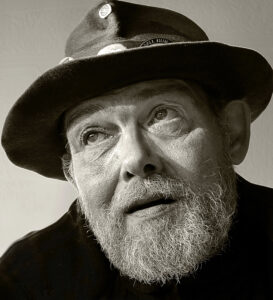
Benny M. Jørgensen var hjemløs, og solgte trofast bladet ” Hus Forbi ” ved et større supermarked på Frederiksundsvej i Brønshøj. Han var en del af gadebilledet i mange år, og de fleste kendte ham som en gemytlig og beskeden fyr, som man altid kunne få en lille snak med. Han brokkede sig aldrig over sin skæbne, og fandt altid en humoristisk vinkel på situationen, dog skinnede en underliggende smerte igennem. Hans øjne lyste af det hele. Glæden over øl til at dulme nerverne gav lindring i begyndelsen, men endte med at koste ham livet i en alder af ca 55 år.
I 2016 fortalte han sin historie til mig. Den blev nedskrevet, trykt og uddelt gratis til alle der var interesserede. Derfra spredte hans historie sig, og nåede på et tidspunkt også frem til statsminister Løkke Rasmussen og departementchefer m.fl. Den blev gengivet i bladet ” Hus Forbi ” som han selv var med til at sælge, som ” sælger nr. 909 “.
Her er hans historie, med egne ord :
” Mange spørger, hvordan jeg blev forfremmet til sælger af ” Hus forbi “. Det er ligesom alle andre karrierer, noget man arbejder henimod igennem et langt liv. Da jeg var teenager, skrev jeg denne historie:
” … Jeg gik i en mørk og lang tunnel, og kunne intet se. Pludselig kunne jeg skimte lyset for enden af tunnellen. Da jeg endelig kom ud i lyset var det så klart og blændende, at jeg stadig intet kunne se … “
Det begyndte nærmest som en drøm. En ung mand og kvinde mødte hinanden, blev gift, flyttede sammen og fik børn. Far arbejdede og mor gik hjemme. Jeg ankom i 1964 som den lille efternøler i en søskendeflok med 5 børn.
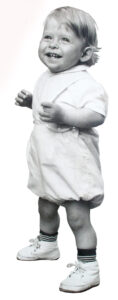
Familien var tilflyttere fra Sejrø, og kendte til trange kår. Med de mange unger var trangen blevet så stor, at familien for at “overleve” med egne hænder byggede eet af de største huse i Skovlunde dengang. Selvom familien leverede arbejdskraften til byggeriet, blev det dyrere end forventet. Det forstærkedes yderligere da de 4 store søskende kort efter min ankomst flyttede hjemmefra. Mine forældre havde nok håbet at de havde hjulpet til med at tjene til føden, og var blevet boende hjemme længere. Sådan gik det til at jeg fra begyndelsen blev “enebarn”, trods en stor søskendeflok. Min far prøvede at redde økonomien ved at cykle rundt og klunse efter arbejdstid. Hans fund blev ikke altid videresolgt, og hjemmet udviklede sig til et depot, hvor der efterhånden kun var trædestier imellem de voksende bunker overalt.
Der gik min mor og jeg så rundt, mens far var på farten. Mor var altid i dårligt humør og orkede ikke noget. Når far endelig var hjemme skændtes de – jeg var ikke gammel før flyvende tallerkener fløj gennem luften når de skændtes. En tallerken fra den ene retning blev besvaret med ti fra den anden. Så jeg havde både “hund og kat”, og “sciencefiction-drama” med flyvende tallerkener på allertætteste hold – hvad mere kan en lille dreng ønske sig ?
Nej, det var hårdt for et lille barn. Min mors dystre humør formørkede atmosfæren – det var enten ” her way ” eller ” the highway ” – og siden da har det været et gennemgående tema i mit liv. Jeg reagerede ved at trække mig, og sådan lærte jeg tidligt at leve som en eremitkrebs, der gemte de bløde og sårbare dele i en hård skal.
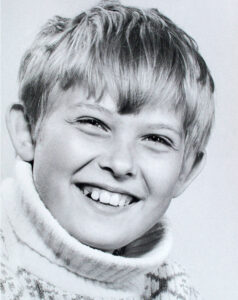
Så kom skoletiden. Det blev fortsættelsen af helvedet hjemme, bortset fra min skolekammerat Ole. Vi kørte på knallert og spillede musik, så det susede for ørerne – og var begge gode med hænderne. Jeg blev sidenhen mekaniker og Ole kleinsmed og professionel musiker.
For en “knallert” som mig var knallerten en drøm, der gik i opfyldelse. Jeg elskede den. Med den kom jeg væk fra den ulykkelige stemning i hjemmet. Det pustede liv i frihedstrang og fremtidsdrømme. Mens jeg en dag stod i indkørslen og rodede med knallerten, kom min mor ud og så træt på mig. Hun havde været syg i lang tid, uden udsigt til bedring. Så spurgte hun om jeg ville på kostskole. Jeg var stadig meget ung, så jeg blev bange og følte at hun forsøgte at jage mig bort – og sagde derfor nej. Jeg kendte jo kun den lille verden derhjemme, hvor jeg for det meste var alene på mit værelse. Dér, skærmet bag skærmen, sad jeg inde, på livstid… først bag TVskærme, så bag computerskærme… altid bag en skærm – og med tiden udviskedes forskellen mellem mig og “Jens Vejmand”: han sad jo også dér, bag skærmen, med klude om sin hånd…
Da jeg et par år efter var kommet i lære som mekaniker, med daglige lange togture mellem hjemmet og værkstedet, blev disse et nyt fristed for mig. Jeg kunne hvile mig, tænke, læse eller sove, uden at skulle stå til regnskab for nogen. Kontrasten mellem den gode og varme stemning i værkstedet og den dårlige stemning hjemme påvirkede mig voldsomt. På vej hjem efter en god dag på værkstedet, begyndte en nagende tvivl at pine mig. Som tiden gik, følte jeg at mit nej til en kostskoleplads var min største fejltagelse. Jeg blev ked af det, og begyndte også at nyde et par øl under togrejsen. Det virkede dulmende på den triste stemning.
Næste lysglimt var den dag, da jeg fik kørekort. Jeg var nærmest lykkelig. Det var som at få adgang til friheden – en mulighed for at komme væk hjemmefra. Far og mor klarede sig igen lidt bedre økonomisk og fik råd til en ny bil – og jeg overtog deres gamle. Fra da af var jeg altid på farten. Jeg mødte snart folk, der var interesserede i store amerikanerbiler. Jeg var selv igang som mekaniker, tjente penge, og snart var jeg med – rullende i Buick, og “grisebilerne” Ford & Ranchero.
Efterhånden som de mørke skygger fra barndomshjemmet kom på afstand steg livsglæden, men øllerne fulgte stadig med og kastede en voksende skygge over mit liv. Snart begyndte også interessen for ” det andet køn “, og jeg gjorde mig de første erfaringer. Da jeg fik min første kæreste, kom den næste overraskelse. Efterhånden som vi lærte hinanden bedre at kende, opdagede jeg, at hun inderst inde var ligesom min mor. Og da ” madammerne ” opdagede at de lignede hinanden, gik det ikke længere. Forholdet gik i stykker – og jeg flyttede ind hos en kammerat, der også havde slået op med sin kæreste. Det gik fint med at dele lejligheden – indtil han fandt en kæreste, som flyttede ind. Så flyttede jeg til en 1-værelses lejlighed, øllerne flyttede med.
Jeg mistede kontrollen, mistede alt, og blev “sofarytter” hos venner og bekendte. Det kunne ikke holde i længden, og jeg påbegyndte en vandring gennem en lang tunnel – ind og ud fra det ene herberg efter det andet, mens jeg indledte en endeløs og fortvivlet kamp med de sociale myndigheder, i håbet om at få et lille skub der kunne hjælpe mig op at stå på mine egne ben igen. Jeg blev holdt hen i uvished i årevis – uvished virker som tortur på mig – “metoden” er udbredt hos de sociale myndigheder, men som de siger : der er jo ikke noget personligt i det – og det er vel det bedste man kan sige om de sociale myndigheders håndtering af “sager” som mig. Men når man er “på spanden”, kan man ikke undgå at se virkeligheden i øjnene i længden – til sidst indså jeg, at den eneste der kan gøre noget for ” Hr. Jørgensen “, det er mig selv. Det var en barsk opvågnen til den virkelighed, der gemte sig under glasuren på den smukke drømmekage : “verdens bedste velfærdssamfund”. Hvem ved iøvrigt om H.C.Andersens eventyr “ Den grimme Ælling ” passer ? Jeg hørte om, “at en svane kan vokse op i en andegård”; men jeg var bare en lille efterladt “ælling”, som tidligt “mistede” sin andemor og kom væk fra flokken – og derfor selv måtte finde ud af hvad jeg var skabt til at være. Se på billederne og døm selv.
Jeg kom til at tænke på den historie, jeg skrev for 35 år siden, som indleder denne fortælling – den foregriber den oplevelse der har fulgt mig hele livet.
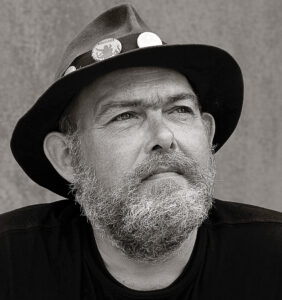
Da min mor blev begravet, fortalte min ældste søster mig, at mor allerede tidligt flere gange havde forsøgt at overtale hende til at adoptere mig, da hun ikke selv magtede det pga hendes sygdom. Der faldt nogle brikker på plads i det rodede puslespil jeg slæber på, men jeg blev også meget trist.
Min skolekammerat, Ole, skrev engang denne historie:
” Der var engang, og den gik jeg igennem. Dér mødte jeg 2 hårløse kvinder, der spillede på tandløse kamme. Pludselig faldt jeg ned i et dybt, sort hul, hvor jeg mødte en trold. Så fik trolden een på kassen … og een på kassen … og een på kassen. Så tog jeg alle kasserne og stablede dem ovenpå hinanden, hvorefter jeg kunne kravle op af det dybe sorte hul … “
For mindre end et halvt år siden fik jeg en lille lejlighed – for første gang et hjem i mere end 8 år. Så længe jeg sælger aviser kan jeg undgå at blive sat på gaden igen – men uden avissalget går det ikke. Der sidder jeg nu med alle de “kasser” jeg har fået “på siden af hovedet” undervejs, og er nu endelig igang med at bygge et nyt liv af dem. Min skolekammerat, Ole´s historie, hjælper mig til at bruge “kasserne” til noget godt.
Her står jeg så idag, efter en lang og målrettet indsats, på min karrieres højdepunkt : som sælger af ” Hus Forbi ” – et blad om barske, men vigtige skæbner. Og for dem der sælger, kan det næsten blive spørgsmålet om liv eller død. Så når du næste gang møder en sælger, og du ikke når at købe avisen eller lære sælgeren lidt at kende, så kan du tage min lille historie frem og tænke på, at hver eneste sælger bærer rundt på en tilsvarende historie om deres liv, håb og drømme. Vi har jo kun et kort øjeblik til at lære hinanden lidt at kende – men med så lidt som et smil, et skulderklap, eller en lille håndsrækning kan vi hjælpe hinanden med at komme videre ! Tak, fordi du tog imod min lille historie. Jeg lytter også gerne til din, hvis vi mødes en anden gang, og du gerne vil dele den med mig.
Venlig Hilsen
Benny
sælger Nr. 909 “
Benny M. Jørgensen er begravet på Assistens Kirkegård, Kbh, hvor der er en afdeling for de ukendte / hjemløse.
.
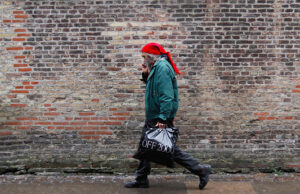
( 5 )
.

Gerth og gæssene … and ” guess Who “
Denne mand er rig, men har ingen penge. Han jager og nedlægger dagligt bytte, uden våben, nok til at føde over hundrede af gadens hjemløse og sultne folk. Han er uden frygt, og taler med alle, høj og lav, mens han ser dem direkte i øjnene – i ordets bedste forstand – og hverken behøver at angribe eller forsvare sig. Han må dagligt bryde det ubrydelige, det daglige brød, lovens ord .. bryde ud i vid over vanvid, bryde igennem i en vanvittig verden, for at redde jord under fødderne, himmel over hovedet og den sunde fornuft samlet af hjertet derimellem. Han er håndens og åndens geni, hestehvisker, gartner, og hyrde uden stav og en brægende flok af rettroende. Ordene flyder ud af munden som lyrisk guld, visdom og hellige skrifter, fra tidlig morgenstund til sen aften.
.
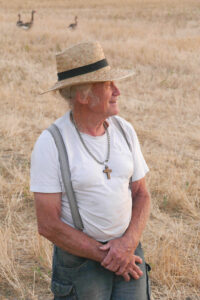
.
Gerth og gæssene … and ” guess Who ” …
Du er lys
levende digt
af kød og blod,
som tænker klart,
og vandrer rundt
blandt menneskene,
.
du ægger, lægger og udruger dem
når du færdes i menneskefarme,
du opmuntrer dem med åbne arme
der kyses som kyllinger og velsigner dem,
du slipper dem løs fra farmen
og giver dem fatningen og hele armen,
så de ikke hovedløst skal ende hos slagteren,
du spørger dem igen og igen
hvor langt de tør gå i deres tro,
.
du lindrer, sår
frø allevegne,
i dine spor spirer
kål, kartofler, æbler og visdom.
.
Du siger ikke ” gør som mig ! ” eller ” følg mig “
men til gengæld : ” hvad kan jeg gøre for dig ?
.
med rødder under fødder, rank som en stamme og hovedet som krone
står du som et træ, der skyder rødder dybere og strækker sine grene længere ind i himlen, og ryster rig frugt af sig,
du ryster al gravitativt og jordfæstet af dig, og bevæger dig let
som frø båret af vinden og tanken, end ikke ordfæstet,
– selv når ordet T A K lyder fra din mund, står alt klart,
som dagens lys, en morgenstund med guld i mund …
.
Tænk Altid Klart
.
– ud flyver ordene, som frie fugle
der samles i flok, som sort sol
og ukendte digte,
som selv ikke du på forhånd kender,
( andet end som “nye gamle venner” )
når du indleder din tale,
– digte som bevæger sig fri, fro og frejdigt
mellem fantasi og en større virkelighed,
som ingen ved hvor fører hen, andet end,
at de vil aldrig svigte – eller falde på hale
for nogen eller noget – ej heller sig selv, det geniale eller gale.
.
– sådan lister du listigt rundt, dag og nat,
med sikkert nattesyn, som en K A T,
smyger dig smidigt for at finde bytte,
går baglæns ind i folk, ved at lytte
rammer hovedet på sømmet,
og finder ad finurlige omveje
den korteste vej
mellem Gud og hver mand,
– med et sikkert instinkt,
og en tro der formår
mere end forstand forstår.
.
Ingen ved hvad du gør,
eller forstår at du tør,
når du hvisker en panisk vild hest
til ro i dine arme, som et lille føl,
ingen tremmer kan holde på en fri fugl,
i al jordisk lede bygger du din rede
og finder en ukendt frihed
.
du er uforklarlig
alt muligt, inklusivt
det der antages for umuligt
– et levende bevis
… Gud eller ej …
.
Gerth, for dig er intet svært
– og selvom jeg ved at jeg intet ved
om tyngdekraftens forhold til lette tanker,
og hvordan alt omkring dig vægtløst løfter sig,
som fjerede væsner, engle og andet ærke’ kræ,
og selv hvis du en dag kaster dit anker,
og står til søs, i sus og dus, i dis og døs
i udvisket overgang mellem liv og død,
så vælger jeg til det sidste at tro på dig.
.
( man skal betænke alternativet,
sådan er livet )
.
.
.
.
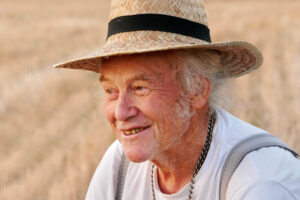
.
.
» Jeg ved, hvor jeg skal hen. Jeg er i evig fred.
Jeg glæder mig ! Jeg glæder mig over hver eneste
dag, jeg får lov at stå op. Jeg glæder mig også til
den dag, jeg kan blive liggende. Og hvis jeg, når jeg skal
herfra, bliver lagt i en båd, rigget med bål og sprængstof,
og sættes til søs … til det hele går i luften … så vil det være
helt i min ånd «
.
Gerth Christensen
( 6 )
.
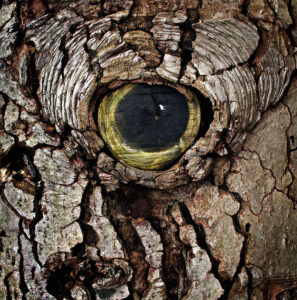
Øjemennesket Kirsten Rose
liv kunst og roser gror på møddinger

Kirsten Rose ( 2000 )
Kirsten Rose var en smuk kvinde fra naturens hånd. Hendes sjæl gjorde hende endnu smukkere. Hun havde et stort hjerte, og en livslang kærlighed til mennesker og kunst. Hun jagtede sammen med John Olsen skrot på lossepladser, der kunne bruges som afsæt for en vidunderlig fantasiverden. De var jægere, legekammerater og fantasiens frontløbere. De kaldte sig for øjemennesker og tingfindere. Leg og alvor smeltede sammen. I de senere år yndede Kirsten Rose at opholde sig i sin seng i den lille lejlighed i Nyboder, Krokodillegade. Hendes helbred var stærkt som altid. Hvis man opfatter livet som en flod, så fandt hun sig godt til rette i flodsengen.
Hun havde mange muligheder og evner, kom godt fra start i livet med en ressourcestærk baggrund, giftede sig siden til endnu mere – men hendes egentlige rigdom lå altid i hendes væren i egen ret, og det liv og den kunst hun delte med andre. For mere end noget andet, mere end det rent materielle, er rigdom en følelse ( … ligesom fattigdom er en følelse … man kan være rig, materielt set, og stadig føle sig fattig ). Alt dette er Kirsten Roses assemblager et vidnesbyrd om.

Kirsten Rose gør døde ting levende. Hun skaber skulptur og smykker af det som andre kasserer. Roser gror på møddinger – forvandler stank og råddenskab til velduft smykker og kunst. Kunst er som perler – et fremmed stof som udskilles af organismen, for at overleve. Liv og død er uadskilleligt – et ubrydeligt kredsløb. Intet forsvinder, alt omformes. Processen er reversibel, skal ikke forklares, men afklares – gennem ånd og hånd. Kirsten Rose indgår selv i processen. Hun er her ikke mere, men hendes væsen og hendes kunst lever videre med voksende styrke.
Manoel de Barros skriver :
” … discarded things are important … like a discarded man … “
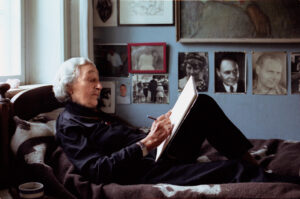
Kirsten Rose, Krokodillegade ( ca 2000 )
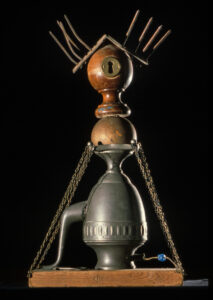
Madam Blå

Guddommeligt Humør Sejrer
.
.
.
.
Rosens drømmeliv
– et virkeligt eventyr om Kirsten Rose
.
God dag …
.
jeg har aldrig andet end gode dage
alle utalte og ens
.
morgensolen kilder mig under fødderne
og aftensolen lægger sig bag hovedgærdet
jeg ligger hvor gærdet er lavest
og følger dens gang med øjnene
til jeg atter vender hviden ud
.
andre plukker blomster på engen
jeg modtager blomster i sengen
.
andre drukner i mængden
jeg flyder i sengen
.
andre ligger vandret i luften
og mister vejret
jeg ligger vandret i sengen
i al slags vejr med mig selv
.
andre får det gale ben ud først
hvilket bensprederi
først som sidst holder vi sammen i sengen
og søger kun adspredelse for sjov
.
andre holder modvilligt sengen
jeg holder af sengen
.
andre søger hvileløst penge og lykke
jeg er ikke sengeløs,
finder mit guld i morgenstund
og er lykkeliggende
.
andre finder det ufatteligt
men jeg ved
at det er behageligt,
at alt starter og ender i sengen
.
som solen
går livet og kærligheden
op og ned
i sengen
.
andre jager fugls føde
flyver højt og lander hårdt
.
jeg ligger trygt i mine dun,
udruger mine æg
og stoler på mine fjer
på flugt
gennem verdensaltet
.
som man reder
så ligger man
.
jeg ligger godt
og er hverken oppe
eller nede på tælling
.
ej heller slår jeg forgæves i dynerne
jeg slår blot mine øjne op
så kommer verden til mig
.
andre frygter skærsilden og verdensbranden
jeg ryger lige i sengen og nyder verdensgabet
.
i mit verdensgab
ser andre lige ned i helvedes flammer
og frygter den dag da de bliver liggende
.
jeg ser bare hen til forfremmelse
.
jeg har før set verden forsvinde
i et kæmpegab
og siger:
kun en tåbe frygter kedsomheden
.
hvad himmel og helvede angår
har jeg da min himmelseng
men trækker dynen godt op om ørerne
når de taler om Sengeløse
.
børnene gribes af rædsel
når de ser mig æde
bananer i pyjamas
.
her ligger jeg
og flyder
dybt i livets flod seng
.
dybt og inderligt
godnat …
.
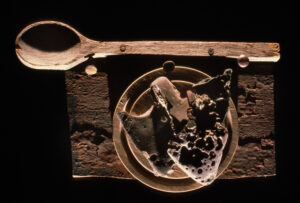
Det daglige Brød
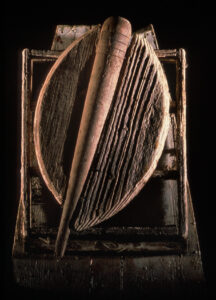
Komposition
.
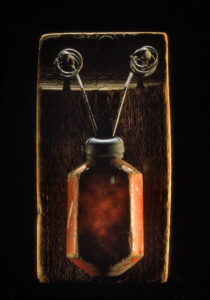
Insektarium
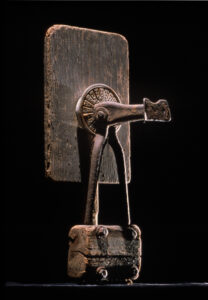
Støttefod
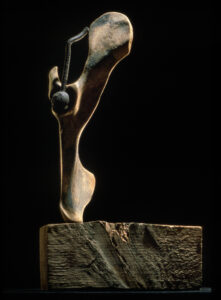
Landkort over “Mellemøsten”, Utopia, ” skåret ind til benet ”
– designet af Sykes-Picot
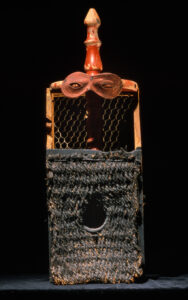
Koptisk Maske
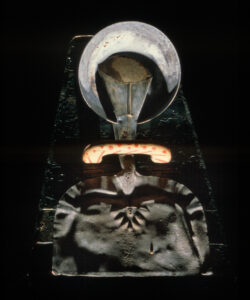
Madonna

Ukendt Gud

Musikkens Stumtjener
.
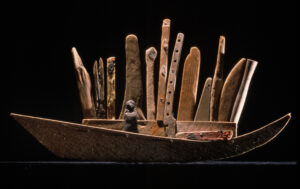
Strandhugst
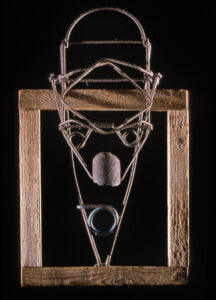
Bærer i rust og ramme
.
.
Barnefoderskovl
( 7 )
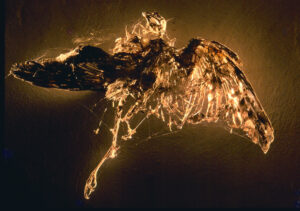
Bethlehem in darkness
Steven Sahiounie, December 16, 2023
” Thus spoke the Profit “
This Christmas, the rooms of all the hotels in Bethlehem are empty, and local businesses are suffering because no Christian pilgrims wanted to travel to what is increasingly looking like a war-zone.
Bethlehem, the birthplace of Jesus, has cancelled Christmas this year. For the first time since modern celebrations began, the birthplace of Jesus will not decorate the Manger Square tree.
In the original first Christmas story, Joseph and Mary were turned away from the inns, as all the rooms were full. This Christmas, the rooms of all the hotels in Bethlehem are empty, and local businesses are suffering because no Christian pilgrims, usually from America and Europe, wanted to travel to what is increasingly looking like a war-zone, as Israel Defense Forces (IDF) constantly raid the Occupied West Bank territory like Jenin.
“In our homes we can celebrate, but in our hearts we are suffering,” said Ibrahim Dabbour, a Greek Orthodox priest. “How can we decorate a Christmas tree?”
The Israeli government has a plan to transform Christian sites at the Mount of Olives into a national park. The future of ancient churches and Biblical sites is uncertain because Israel wants to ultimately turn them all into tourist attractions for profit after they have gotten rid of the Christians.
 Sign on door: ” PRIVATE ” – divide and rule
Sign on door: ” PRIVATE ” – divide and rule
The war in Gaza and West Bank raids
The IDF raids and attacks in the Occupied West Bank, with subsequent arrests, have been going on well before, but have intensified after the October 7 attack on Israel by Hamas which killed over 1,000 Israelis.
Heads of various churches in Jerusalem, the Occupied West Bank, and Jordan have made a collective decision to make this Christmas a somber one, in solidarity with the suffering of the Palestinians in Gaza, and the death toll now above 17,000 and rising daily in the Israeli war on Gaza.
Christmas is a public holiday in the Muslim-majority Jordan, with many city squares and shopping malls feted with seasonal decorations. But congregations throughout the country will now forgo the traditional festivities of public tree lighting, Christmas markets, scout parades, and distribution of gifts to children.
American Evangelical Zionists
“We have a role to speak to our friends in the West,” said David Rihani, president and general superintendent of the Assemblies of God Church of Jordan. “Jesus did not teach us to blindly side with anyone against another.”
He referred to a viral video of Tennessee-based pastor Greg Locke calling on Israel to turn Gaza into a “parking lot” and to blow up the Dome of the Rock to make room for the Third Temple and usher in the return of Jesus. Local evangelicals of the Holy Lands, Rihani said, refuse to be associated with such Christian Zionism.
John Munayer, a Jerusalemite Palestinian who belongs to the small Palestinian Evangelical Church, said that the harassment of Christians, which has increased especially over the past six months, has international ramifications.
“In the international Christian world there are those who passionately support Israel, those who identify with the Palestinian struggle against the occupation, and a great many who are somewhere in between,” Munayer said. “I go around international conferences and communities. The violent events move the needle and make many people question what the right attitude is toward Israel, and toward Jews.”
Palestinian Christians under attack by Israelis
From April 2 to May 10, 2002, the Church of the Nativity in Bethlehem in the West Bank was besieged by the Israel Defense Forces (IDF). On April 7, 2002 Vatican City warned Israel to respect religious sites in line with its international obligations. On April 20, 2002 the Greek Orthodox Church of Jerusalem called upon Christians worldwide to make the upcoming Sunday a “solidarity day” for the people in the church and the church itself, and called for immediate intervention to stop what it referred to as the “inhuman measures against the people and the stone of the church”.
Ahead of Christmas 2018, Israel banned the Christian minority who live in the Gaza Strip from visiting Christian holy sites and churches in the West Bank and Jerusalem to celebrate Christmas.
Around 5,000 Christians, most of whom are Greek Orthodox, lived in the Gaza Strip before Israel and the Palestine Liberation Organization signed Oslo peace accords in 1994. However, their number dramatically declined because of the continuing conflict between Israelis and Palestinians.
Christians in the Gaza Strip, home to 2 million Palestinians, used to travel every year to the West Bank city of Bethlehem and Jerusalem to join Palestinian Christians there to celebrate Christmas and the New Year.
Ahead of Easter 2017, Christian Palestinians looking to enter Jerusalem required the approval of the Defense Ministry’s Coordinator of the Government’s Activities in the Territories.
On January 26, 2023, Miran Krikorian, the Armenian owner of Taboon and Wine Bar in the Old City of Jerusalem, received a call that a mob of Israeli settlers was attacking his bar in the Christian Quarter and shouting “Death to Arabs … Death to Christians.”
When he went to the police, the officer scolded him for bothering to report the crime.
A few days later, Armenians leaving a memorial service in the Armenian Quarter were attacked by Israeli settlers carrying sticks. An Armenian was pepper-sprayed as settlers scaled the walls of the Armenian convent, trying to take down its flag, which had a cross on it. When Armenians chased them away, the settlers began shouting: “Terrorist attack,” prompting the police to draw their guns on the Armenians, beating and arresting one of victims.
Hostility by Jews towards Jerusalem’s Christian community is persistent and covers all denominations. Since 2005, Christian celebrations around Holy Week, particularly Holy Fire Saturday, have brought military barricades and harsh treatment from soldiers and Jewish settlers alike, with the number of worshippers allowed inside the Church of the Holy Sepulchre drastically limited, from as many as 11,000 historically during the Holy Fire ceremony to just 1,800 since last year.
Since Israel’s current Jewish extremist government came to power, incidents against Christians in Jerusalem have reportedly become more violent and common. At the beginning of the year, 30 Christian graves at the Protestant Mount Zion Cemetery were desecrated.
At the Church of the Flagellation, a Jewish settler attacked a statue of Jesus with a hammer, and an Israeli came to the Church of Gethsemane during Sunday religious services and tried to attack the priest with an iron bar. Being spat upon and shouted at by Israelis has become, for Christians, “a daily occurrence”. Victims of these incidents report little is done by police to catch or punish attackers.
“My fear is that these perpetrators are known, but they enjoy impunity,” said Munib Younan, bishop emeritus of the Evangelical Lutheran Church. “That’s the reason they are doing this.”
The Franciscans have set up cameras in all corners of their holy sites, which are becoming more closed off from the public due to the persistent attacks.
Ideologically, the primary source for this targeting of Christians and their holy sites comes from extremist Jewish groups, according to community and church leaders.

“Their mind is obsessed with the ‘Messianic syndrome’. They want to take over the whole land,” said Greek Orthodox Patriarch Theophilos III of Jerusalem.
Jews know they are above the law, and they can harass Christians, even with guns and get away with it. They call Christians “pagans” and “idol worshippers”.
“The minister of national security is a lawyer who used to defend extremist Jews attacking Christian and other sites,” said one Armenian youth who was attacked in January, referring to Itamar Ben-Gvir. “What do you expect when the highest-ranking official in the equation is the most extremist?”
The Jews are spitting on Christians
On October 5, Israel’s minister in charge of crime and policing, Itamar Ben-Gvir, said it’s not a crime for Israeli Jews to spit on Christians. Spitting on people of a minority religion would be considered a hate crime in most countries, but for the Israeli government it is simply ‘an old Jewish tradition’.
In July 2023, during the Catholic Pentecost ceremony, about 20 ultra-Orthodox Jews blew trumpets and cursed loudly to sabotage the ceremony. “We are very concerned about the religious freedom of Christians in Jerusalem,” said a representative of the U.S. State Department who was present at the ceremony.
The Upper Room, in which the Last Supper was said to have taken place, was the scene of a mass in June, but Jews blasted noise outside speakers to mar the event, and two weeks later a Jewish man smashed the windows of the Upper Room.
Since the beginning of 2023, a large number of cases of vandalism have been recorded in Jerusalem’s Old City including 20 hate crimes against Christians, such as the graffiti that reads “Jesus son of Mary the whore”.
In June, a conference under the title “Why are Jews spitting on non-Jews?” was held in the Old City, but was boycotted by Israel’s Ministry of Foreign Affairs.
Robby Berman, an Israeli Jewish tour guide, said he was witness to two incidents of spitting, and that he is disturbed by the lack of enforcement in cases of harassment against Christians. After witnessing two boys spitting at Greek Orthodox priests at Jaffa Gate one Saturday morning, he flagged two Israeli police officers standing by them, but they refused to take action.
Berman was himself the victim of a spitting attack while chatting with a Palestinian security guard on the Via Dolorosa. As they were speaking, Berman said, “a modern ultra-Orthodox family walked passed — a father, a mother, a young couple, and many children. The young man spat at my legs,” as he was mistaken for a non-Jew.
*
**
Pastor Munther Issac at the Evangelical Lutheran Church in Bethlehem, delivered a powerful Christmas sermon on the war in Gaza and why the world must stand with Palestinians. ” The hypocrisy and racism of the Western world is transparent and appalling ” :
https:/∆/video.twimg.com/amplify_video/1739637697306587136/vid/avc1/640×360/jgu8SBTuTTPYU86f.mp4
( remove ∆ and you have the full link )
*
*
( 8 )

Map of ” Middleeast “, Utopia, ” cut to the bone “. Design: Sykes-Picot
( Landkort over “Mellemøsten”, Utopia, ” skåret ind til benet ” – design: Sykes-Picot )
The Death of Israel
( Chris Hedges )
” Thus spoke the Profet “
Settler colonial states have a terminal shelf life. Israel is no exception
Israel will appear triumphant after it finishes its genocidal campaign in Gaza and the West Bank. Backed by the United States, it will achieve its demented goal. Its murderous rampages and genocidal violence will exterminate or ethnically cleanse Palestinians. Its dream of a state exclusively for Jews, with any Palestinians who remain stripped of basic rights, will be realized.
It will revel in its blood-soaked victory. It will celebrate its war criminals. Its genocide will be erased from public consciousness and tossed into Israel’s huge black hole of historical amnesia. Those with a conscience in Israel will be silenced and persecuted.
But by the time Israel achieves its decimation of Gaza — Israel is talking about months of warfare — it will have signed its own death sentence. Its facade of civility, its supposed vaunted respect for the rule of law and democracy, its mythical story of the courageous Israeli military and miraculous birth of the Jewish nation, will lie in ash heaps.
Israel’s social capital will be spent. It will be revealed as an ugly, repressive, hate-filled apartheid regime, alienating younger generations of American Jews. Its patron, the United States, as new generations come into power, will distance itself from Israel the way it is distancing itself from Ukraine. Its popular support, already eroded in the U.S., will come from America’s Christianized fascists who see Israel’s domination of ancient Biblical land as a harbinger of the Second Coming and in its subjugation of Arabs a kindred racism and white supremacy.
Palestinian blood and suffering — 10 times the number of children have been killed in Gaza as in two years of war in Ukraine — will pave the road to Israel’s oblivion. The tens, perhaps hundreds, of thousands of ghosts will have their revenge. Israel will become synonymous with its victims the way Turks are synonymous with the Armenians, Germans are with the Namibians and later the Jews, and Serbs are with the Bosniaks. Israel’s cultural, artistic, journalistic and intellectual life will be exterminated. Israel will be a stagnant nation where the religious fanatics, bigots and Jewish extremists who have seized power will dominate public discourse. It will find its allies among other despotic regimes. Israel’s repugnant racial and religious supremacy will be its defining attribute, which is why the most retrograde white supremists in the U.S. and Europe, including philo-semites such as John Hagee, Paul Gosar and Marjorie Taylor Greene, fervently back Israel. The vaunted fight against anti-Semitism is a thinly disguised celebration of White Power.
Despotisms can exist long after their past due date. But they are terminal. You don’t have to be a Biblical scholar to see that Israel’s lust for rivers of blood is antithetical to the core values of Judaism. The cynical weaponization of the Holocaust, including branding Palestinians as Nazis, has little efficacy when you carry out a live streamed genocide against 2.3 million people trapped in a concentration camp.
Nations need more than force to survive. They need a mystique. This mystique provides purpose, civility and even nobility to inspire citizens to sacrifice for the nation. The mystique offers hope for the future. It provides meaning. It provides national identity.
When mystiques implode, when they are exposed as lies, a central foundation of state power collapses. I reported on the death of the communist mystiques in 1989 during the revolutions in East Germany, Czechoslovakia and Romania. The police and the military decided there was nothing left to defend. Israel’s decay will engender the same lassitude and apathy. It will not be able to recruit indigenous collaborators, such as Mahmoud Abbas and the Palestinian Authority — reviled by most Palestinians — to do the bidding of the colonizers. The historian Ronald Robinson cites the inability to recruit indigenous allies by the British Empire as the point at which collaboration inverted into noncooperation, a defining moment for the start of decolonization. Once noncooperation by native elites morphs into active opposition, Robinson explains, the Empire’s “rapid retreat” is assured.
All Israel has left is escalating violence, including torture, which accelerates the decline. This wholesale violence works in the short term, as it did in the war waged by the French in Algeria, the Dirty War waged by Argentina’s military dictatorship and during Britain’s conflict in Northern Ireland. But in the long term it is suicidal.
“You might say that the battle of Algiers was won through the use of torture,” the British historian Alistair Horne observed, “but that the war, the Algerian war, was lost.”
The genocide in Gaza has turned Hamas fighters into heroes in the Muslim world and the Global South. Israel may wipe out the Hamas leadership. But the past — and current — assassinations of scores of Palestinian leaders has done little to blunt resistance. The siege and genocide in Gaza has produced a new generation of deeply traumatized and enraged young men and women whose families have been killed and whose communities have been obliterated. They are prepared to take the place of martyred leaders. Israel has sent the stock of its adversary into the stratosphere.
Israel was at war with itself before Oct. 7. Israelis were protesting to prevent Prime Minister Benjamin Netanyahu’s abolition of judicial independence. Its religious bigots and fanatics, currently in power, had mounted a determined attack on Israeli secularism. Israel’s unity since the attacks is precarious. It is a negative unity. It is held together by hatred. And even this hatred is not enough to keep protestors from decrying the government’s abandonment of Israeli hostages in Gaza.
Hatred is a dangerous political commodity. Once finished with one enemy, those who stoke hatred go in search of another. The Palestinian “human animals,” when eradicated or subdued, will be replaced by Jewish apostates and traitors. The demonized group can never be redeemed or cured. A politics of hatred creates a permanent instability that is exploited by those seeking the destruction of civil society.
Israel was far down this road on Oct. 7 when it promulgated a series of discriminatory laws against non-Jews that resemble the racist Nuremberg Laws that disenfranchised Jews in Nazi Germany. The Communities Acceptance Law permits exclusively Jewish settlements to bar applicants for residency on the basis of “suitability to the community’s fundamental outlook.”
Many of Israel’s best educated and young have left the country to places like Canada, Australia and the U.K., with as many as one million moving to the United States. Even Germany has seen an influx of around 20,000 Israelis in the first two decades of this century. Around 470,000 Israelis have left the country since Oct. 7. Within Israel, human rights campaigners, intellectuals and journalists — Israeli and Palestinian — are attacked as traitors in government-sponsored smear campaigns, placed under state surveillance and subjected to arbitrary arrests. The Israeli educational system is an indoctrination machine for the military.
The Israeli scholar Yeshayahu Leibowitz warned that if Israel did not separate church and state and end its occupation of the Palestinians, it would give rise to a corrupt Rabbinate that would warp Judaism into a fascistic cult. “Israel,” he said, “would not deserve to exist, and it will not be worthwhile to preserve it.”
The global mystique of the U.S., after two decades of disastrous wars in the Middle East and the assault on the Capitol on Jan. 6, is as contaminated as its Israeli ally. The Biden administration, in its fervor to unconditionally support Israel and appease the powerful Israel lobby, has bypassed the congressional review process with the Department of State to approve the transfer of 14,000 rounds of tank ammunition to Israel. Secretary of State Antony Blinken argued that “an emergency exists that requires the immediate sale.” At the same time he has cynically called on Israel to minimize civilian casualties.
Israel has no intention of minimizing civilian casualties. It has already killed 18,800 Palestinians, 0.82 percent of the Gazan population — the equivalent of around 2.7 million Americans. Another 51,000 have been wounded. Half of Gaza’s population is starving, according to the U.N. All Palestinian institutions and services that sustain life — hospitals (only 11 out of 36 hospitals in Gaza are still “partially functioning”), water treatment plants, power grids, sewer systems, housing, schools, government buildings, cultural centers, telecommunications systems, mosques, churches, U.N. food distribution points — have been destroyed. Israel has assassinated at least 80 Palestinian journalists alongside dozens of their family members and over 130 U.N. aid workers along with members of their families. Civilian casualties are the point. This is not a war against Hamas. It is a war against the Palestinians. The objective is to kill or remove 2.3 million Palestinians from Gaza.
The shooting dead of three Israeli hostages who apparently escaped their captors and approached Israeli forces with their shirts off, waving a white flag and calling out for help in Hebrew is not only tragic, but a glimpse of Israel’s rules of engagement in Gaza. These rules are — kill anything that moves.
As the retired Israeli Major General Giora Eiland, who formerly headed the Israeli National Security Council, wrote in Yedioth Ahronoth, “[T]he State of Israel has no choice but to turn Gaza into a place that is temporarily or permanently impossible to live in…Creating a severe humanitarian crisis in Gaza is a necessary means to achieve the goal.” “Gaza will become a place where no human being can exist,” he wrote. Major General Ghassan Alian declared that in Gaza, “there will be no electricity and no water, there will only be destruction. You wanted hell; you will get hell.”
Settler colonial states that endure, including the United States, exterminate through diseases and violence nearly the entirety of their indigenous populations. Infectious diseases brought by the colonizers to the Americas, such as smallpox, killed an estimated 56 million indigenous people over about 100 years in South, Central and North America. By 1600 less than a tenth of the original population remained. Israel cannot kill on this scale, with nearly 5.5 million Palestinians living under occupation and another 9 million in the diaspora.
The Biden presidency, which ironically may have signed its own political death certificate, is tethered to Israel’s genocide. It will try to distance itself rhetorically, but at the same time it will funnel the billions of dollars of weapons demanded by Israel — including $14.3 billion in supplemental military aid to augment the $3.8 billion in annual aid — to “finish the job.” It is a full partner in Israel’s genocide project.
Israel is a pariah state. This was publically on display on Dec. 12 when 153 member states at the U.N. General Assembly voted for a ceasefire, with only 10 — including the U.S. and Israel — opposed and 23 abstaining. Israel’s scorched earth campaign in Gaza means there will be no peace. There will be no two state solution. Apartheid and genocide will define Israel. This presages a long, long conflict, one the Jewish State cannot ultimately win.
( 9 )
.
.
.
.

.
.
” Thus spoke Zarathustra “
( F. Nietzsche )
quotes :
“ I am a forest, and a night of dark trees: but he who is not afraid of my darkness, will find banks full of roses under my cypresses. ”
“ The higher we soar the smaller we appear to those who cannot fly. ”
“ But the worst enemy you can meet will always be yourself; you lie in wait for yourself in caverns and forests. Lonely one, you are going the way to yourself! And your way goes past yourself, and past your seven devils! You will be a heretic to yourself and witch and soothsayer and fool and doubter and unholy one and villain. You must be ready to burn yourself in your own flame: how could you become new, if you had not first become ashes ? ”
“ Silence is worse; all truths that are kept silent become poisonous. ”
“ There is more wisdom in your body than in your deepest philosophy. ”
“ Become who you are ! ”
“ And once you are awake, you shall remain awake eternally. ”
“ One must be a sea, to receive a polluted stream without becoming impure. ”
“ But it is the same with man as with the tree. The more he seeks to rise into the height and light, the more vigorously do his roots struggle earthword, downword, into the dark, the deep – into evil. ”
“ No shepherd and one herd! Everybody wants the same, everybody is the same: whoever feels different goes voluntarily into a madhouse. ”
“ He who climbs upon the highest mountains laughs at all tragedies, real or imaginary. ”
“ He who obeys, does not listen to himself ! ”
.
.
.
.
Du vil muligvis også synes om

CARPE DIEM # 4 – blue suite, sweet blues
2023-04-01
Beskyttet: kladde
2024-01-20